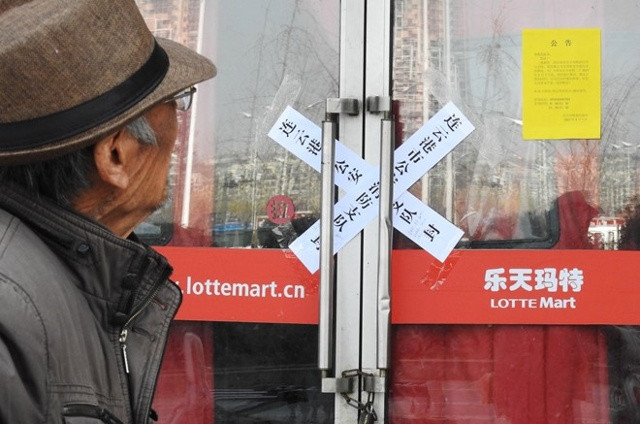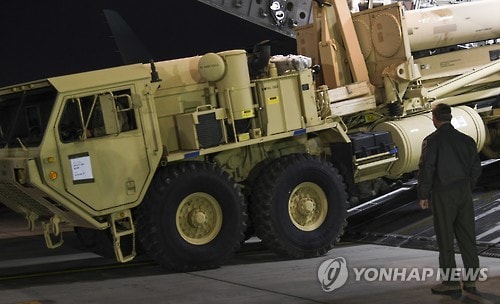General Cuong: After tension on the Korean Peninsula comes US-China confrontation
(Baonghean) - Is the Terminal High Altitude Area Defense (THAAD) missile defense system that the US and South Korea have begun deploying the spark that has caused tensions on the Korean Peninsula to escalate to an unusual level?
The analysis of Associate Professor, Doctor, Major General Le Van Cuong - Former Director of the Institute of Strategy and Science, Ministry of Public Security, suggests a deeper look at this issue.
 |
| A man stands watching a closed Lotte Mart store in China on the morning of March 7. Photo: Getty. |
PV:Major General, the North Korean issue is not new, as it has been in a constant state of tension for decades. This time, international public opinion believes that this hot spot is becoming unusual. Do you agree with that assessment and why?
Major General Le Van Cuong:Yes, the Korean Peninsula has always been hot, because of the tension and direct confrontation between Pyongyang and Seoul, not to mention the confrontation with Tokyo or Washington.
North Korea has conducted numerous nuclear bomb and ballistic missile tests, and has been banned from nuclear or ballistic missile tests by the United Nations Security Council on several occasions. China, considered North Korea's closest ally, has supported six UN Security Council resolutions, showing that it supports the denuclearization of the Korean Peninsula.
Most recently, North Korea launched four medium-range ballistic missiles, three of which landed in Japan's exclusive economic zone. The difference in this development lies in the US-South Korea decision to deploy THAAD in South Korea and the fact that the US has transferred some of its military equipment to the allied territory.
Notably, not only North Korea but also China reacted strongly to this move, pushing tensions beyond the scope of the Korean Peninsula, implying a US-China confrontation, or more precisely, a US-Japan-Korea triangle with China. That is the unusual point this time, explaining the great public interest in recent days.
PV:How can we explain China's strong reaction to the US-South Korea THAAD deployment, Major General?
Major General Le Van Cuong:The US and South Korea announced that the deployment of THAAD is to proactively prevent and respond to North Korea's provocative actions (ballistic missile launches, nuclear tests, etc.). But China does not believe in that "surface" explanation, because according to them, THAAD with its extremely powerful radar system is capable of tracking even China's intercontinental missile systems in the Northeast of the country.
From Beijing's perspective, THAAD is capable of covering a large area of their territory. Therefore, they are concerned that THAAD is not only a countermeasure to North Korea, but also a threat to China's security and a shift in the military balance in Northeast Asia.
They strongly protested, not only through diplomatic channels, but also with specific moves to “attack” the economic sector. That is, discouraging Chinese people from traveling to Korea, suspending Lotte Group’s billion-dollar business expansion project in this country, and even Chinese people have begun to think of boycotting imported products from the land of kimchi.
PV:Recently, many people think that North Korea's missile test is a "test" for the new administration of US President Donald Trump. Is that correct? Can the Major General comment further on this point of view?
Major General Le Van Cuong:This view has its own logic. Launching missiles is obviously very expensive, for example, the four latest missiles launched by North Korea each cost 5-10 million USD. Therefore, they cannot just launch them for fun, but must consider what motive each missile serves.
North Korea said it did so to respond to and deter the US-South Korea joint military exercises, but it does not rule out the possibility that Pyongyang wanted to secretly test Trump's reaction.
PV:Based on recent developments, people are also guessing that “new mandarin, new policy”, Trump will have a completely different approach to North Korea than his predecessor Barack Obama. What does the Major General think about this?
Major General Le Van Cuong:During the election campaign as well as when he became the US president, Trump made many statements that were considered quite tough on North Korea. With a firm stance demanding that Pyongyang end its nuclear program on the Peninsula and strictly implement the resolutions of the United Nations Security Council, Trump's intention is to put strong pressure on China so that China can influence North Korea.
However, in reality, it seems that Trump cannot hide his confusion regarding the nuclear issue on the Korean Peninsula. Because, in fact, he does not have many "cards" to use to respond.
Regarding foreign policy towards China, South Korea, North Korea or Japan, up to this point, Trump has basically not shown any difference from his predecessor. Therefore, Trump's declaration that he will completely resolve the North Korea issue seems difficult to realize, the only way to find a way out will be through negotiation.
 |
| A THAAD launcher is unloaded from a transport plane at Osan Air Base, South Korea. Photo: Yonhap. |
PV:Surely the top concern now surrounding this topic is the future of the North Korea issue. According to the Major General, will the US and South Korea accept to abandon or postpone the deployment of THAAD in South Korea? Can the Major General share his own forecast about the possibility of solving the ballistic missile and nuclear issue in the near future?
Major General Le Van Cuong:China is expected to continue to react strongly, and if the US and South Korea complete the THAAD deployment, threatening China's security and distorting the current military structure in Northeast Asia, they will respond and declare that the US and South Korea must bear that responsibility.
It is not yet known how China will respond, but it can be said that the US and South Korea will not stop in the face of Beijing's fierce reaction, and will certainly continue to firmly deploy THAAD. At that time, the existing tension on the Korean Peninsula will fall into a big spiral.
Overall, the North Korean issue remains the most difficult hot spot in the world today, because in essence it is a confrontation between China and the US. The secret or direct confrontation between China and North Korea on one side and the US, Japan and South Korea on the other will result in one of three scenarios: One is to maintain the current tension, but still within the scope of restraint and control; two is that North Korea ends its nuclear and missile programs, strictly implements the resolution of the United Nations Security Council; and three is that war breaks out, not excluding the possibility of using nuclear weapons.
From a personal research perspective, I believe that the second scenario is unlikely, North Korea has not and will never truly give up its nuclear program. War involving the use of nuclear weapons is also very unlikely, at least in the near future - under the terms of US President Donald Trump and Chinese President Xi Jinping.
Thus, the most likely possibility is that this turbulent Peninsula will continue to be constantly tense, interspersed with bilateral and multilateral dialogues and exchanges, and the cycle of tension - dialogue - tension will continue to repeat itself in the following years.
PV:Thank you very much, Major General!
Thu Giang
(Perform)
